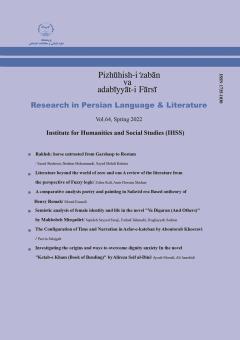Investigating the origins and ways to overcome dignity anxiety In the novel "Ketab-e Kham (Book of Bending)" by Alireza Seif al-Dini
Subject Areas : Research in Iranian classical literatureayoob moradi 1 * , Ali Jamshidi 2
1 - Associate Professor, Department of Persian Language and Literature, Payam Noor University, Tehran, Iran.
2 - Assistant Professor, Department of Business Administration, Payam Noor University, Tehran, Iran.
Keywords: Dignity Anxiety, Alain de Botton, "Ketab-e Kham (Book of Bending)", Alireza Seif al-Dini. ,
Abstract :
The need to be seen, affirmed, and recognized as successful human are emerging needs that have emerged as a result of material and technological advances in the modern age. Needs that, if left unmet, can lead to destructive anxiety. Contemporary philosopher Alain de Botton categorizes these anxieties as "dignity anxiety" and describes the causes and ways to deal with them. The idea put forward by Alain de Botton, was soon noticed by the authors, and numerous works in various artistic formats were created on this subject. Alireza Seif al-Dini's novel "Ketab-e Kham (Book of Bending)" is one of these works in which the author deals with the tumultuous life of a man who steps on his ideals in order to overcome the anxiety of dignity and to be recognized as a powerful husband and father. The present study, which has been written with a descriptive-analytical method, seeks to analyze the regressive process of his life while describing the backgrounds of the mentioned anxiety in the main character of the story. The results show that factors such as the importance of well-being and material development, changing the criteria for valuing poverty and wealth and the effectiveness of the offspring, along with fear of looking weak by the spouse and fear of not fulfilling paternal duties properly, cause anxiety in the person. The anxiety that the mentioned character seeks a way out of by paying attention to philosophy, art, the religious doctrine of death and the bohemian lifestyle.
بابك معين، مرتضي (1396) ابعاد گمشدة معنا در نشانهشناسي روايي كلاسيك، تهران، علمي و فرهنگي.
پيير، ماري (1385) «درباب سرگذشت اضطراب»، ترجمة زهرا وثوقي، نشرية سمرقند، شمارة 13 و 14، صص 25-34.
دوباتن، آلن (1390) تسلیبخشیهای فلسفه، ترجمة عرفان ثابتی، تهران، ققنوس.
--------- (1397) آرامش، ترجمة محمد كريمي، تهران، كتابسراي نيك.
--------- (1398) اضطراب منزلت، ترجمة شقايق نظرزاده، تهران، فرمهر.
ديلمي، حسنبنمحمد (1397) ارشادالقلوب، ترجمة صادق حسنزاده، قم، آل علي.
رضايي، رؤيا، محمدامير مشهدي و حميدرضا شعيري (1398) «بررسي سبك زندگي نيمايوشيج در نامههاي او»، پژوهش ادبيات معاصر جهان، دورة 24، شمارة 1، صص 119-147.
سيفالديني، عليرضا (1399) كتاب خم، تهران، نيماژ.
عسگری یزدی، علی و مسعود میرزایی (1397) «مرگاندیشی و معنای زندگی در هایدگر»، فلسفة دین، دورة 15، شمارة 1، صص 25-49.
كافيالدين، ابيالحسن علي ليثي (1377) عيون الحكم و المواعظ، قم، مؤسسة فرهنگي دارالحديث.
كوئن، دارل (1400) سرشت شر، ترجمة بهار رهادوست، تهران، نشر هنوز.
گرجی، مصطفی (1388) «انواع ادبی و اضطرابهای بشری با توجه به آرای پل تیلیش»، فصلنامة نقد ادبی، دورة 2، شمارة 6، صص 185-198.
------------ (1399) «بررسی و تحلیل رمان رهش با توجه به دیدگاههای آلن دوباتن (اضطراب موقعیت)»، ادبیات پارسی معاصر، سال 10، شمارة 2، صص 329-353.
مجلسي، محمدباقر (1384) بحارالانوار، تهران، مكتبه الاسلاميه.
مرادی، ایوب و سارا چالاک (1401) «اصول و شیوههای نگارش نقد روانشناسانه با استفاده از رویکرد روانشناسی شناختی»، دوفصلنامة پژوهشهای میانرشتهای زبان و ادبیات فارسی، دورة 1، شمارة 1، صص 25-1.
مقدسي، ريحانه و غلامرضا منشئي (1394) «مقايسة اثربخشي گروهدرماني وجودي با هنردرماني گروهي بر كاهش اضطراب هستيشناسانه»، پژوهشهاي روانشناسي باليني، سال 5، شمارة 2، 122-135.
يالوم، اروين (1397) رواندرماني اگزيستانسيال، ترجمة سپيده حبيب، تهران، نشرني.
يداللهزاده طبري، ناصرعلي (1379) «درآمدهاي نفتي و بيماري هلندي، تحولات ساختاري اقتصاد ايران طي دهههاي 1350 و 1360»، اطلاعات سياسي و اقتصادي، شمارة 153 و 154، صص 206-222.
هومر، شان (1388) ژاك لاكان، ترجمة محمدعلي جعفري و ابراهيم طاهايي، تهران، ققنوس.

